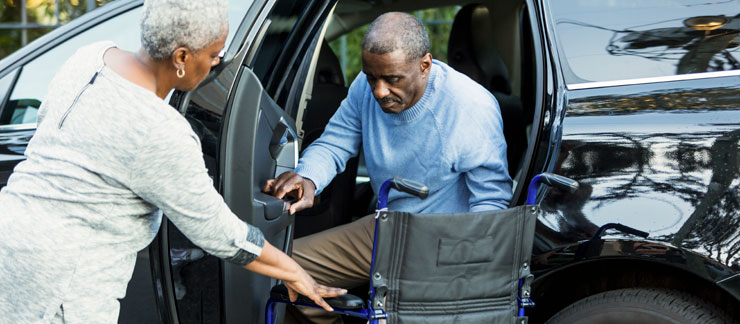
What to Do When Your Aging Parent’s Mobility is Limited
When your aging parent has mobility issues that prevent them from getting around easily, it can be challenging for them — and for you. Being concerned and anxious about their limited mobility and declining independence is normal.
Whether your loved one can no longer drive, has trouble walking long distances, or requires a walker or wheelchair, there are ways to support them while ensuring they receive the compassionate senior care they deserve.
Risk Factors For Mobility Concerns
Although aging is the primary risk factor for mobility challenges, other conditions may also increase your loved one’s risk of experiencing problems, including:
- Low activity levels
- Obesity
- Loss of muscle tone and strength
- Balance impairment
- Depression
- Dementia
- A recent hospitalization or health event
- Chronic conditions, such as diabetes, arthritis, and neurological disorders
Fortunately, some of these issues may be treatable — through rehabilitation, medication, or mental health care. Talk to your loved one’s physician if they have any risk factors.
Strategies For Coping With Mobility Challenges
One of the most significant challenges of managing mobility concerns is adjusting to a “new normal.” Although it may take some time and creativity, an older adult can maintain their quality of life—even if how they get around has changed.
Support from you, other family members, and an in-home caregiver can help them stay positive throughout this adjustment period.
Here are a few strategies to help you and your loved one cope with mobility changes:
- Ask for help
If balancing your personal, family, work responsibilities, and caregiving duties become difficult, ask for help from family members, friends, and neighbors — or hire a Visiting Angels in-home personal care provider. When you can’t be there for your loved one, in-home caregivers can provide companionship and help your loved one with personal care tasks, medication reminders, light housekeeping, errands, and more.
- Empathize
It can be difficult for an older adult who has been independent all their life to rely on others for rides, groceries, and help with personal needs. If your loved one sometimes seems frustrated, try not to take it personally. Listen to their concerns and provide reassurance to help improve their emotional well-being.
- Provide opportunities to socialize
Older adults with mobility concerns can easily become socially isolated, which can increase the risk of anxiety and depression. Be sure to provide your older adult with plenty of opportunities to socialize with others — and facilitate transportation, if possible. Attending religious services, visiting a senior center, going to lunch with a friend, or inviting a friend over for a visit are all good options to raise your loved one’s spirits.
- Enhance home safety
You can reduce your loved one’s risk of falling by installing grab bars, raised toilet seats, shower/tub seats, and other equipment in the bathroom, removing clutter and rugs, improving lighting, and installing non-slip flooring and mats. In-home caregivers can identify hazards around the house and provide stand-by assistance.
Professional Caregivers Can Help Seniors With Mobility Issues
Mobility concerns are certainly life-changing, but with proper support and planning, they don’t have to limit your loved one’s quality of life.
If you notice problems with your aging loved one’s mobility, consider hiring Visiting Angels to assist in their day-to-day care. Our local coordinators will meet with you and your loved one for a no-cost home care consultation to discuss specific needs and requests.


